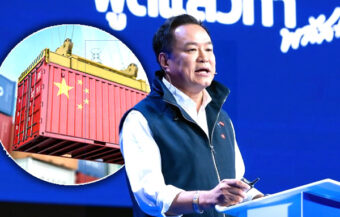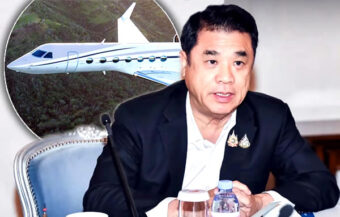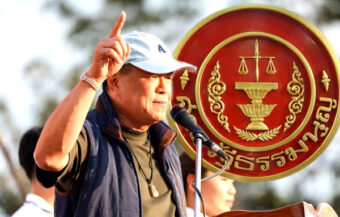Thanathorn Juangroongruangkit blames 20 years of political chaos for Thailand’s collapsing birth rate and economic decline. He warns the country lacks “brains and heart” to move forward, calling for urgent political and economic reforms to rebuild confidence and growth.
Thanathorn Juangroongruangkit didn’t hold back Thursday, blaming Thailand’s collapsing birth rate and economic decay on two decades of relentless political instability. The former Future Forward leader—who shook up Thai politics and paved the way for today’s People’s Party—is now demanding a full reset of the country’s political and economic systems. He slammed plans to pour ฿200 billion into foreign-made trains, mostly from China, when Thailand could build its own for a fraction—just ฿8 billion. Two lost decades, he warned, have gutted confidence, stalled growth and left the country with “neither brains nor heart” to reach its potential.

Mr. Thanathorn, the leader of Thailand’s progressive movement and former leader of the breakthrough but now dissolved Future Forward Party, delivered a sobering assessment of Thailand’s direction on Thursday, August 7, 2025.
Speaking at the Sirindhorn Anthropology Centre during the 2025 Nidhi Eoseewong Lecture, he declared that 20 years of political conflict have devastated the country in every way. He stressed that Thailand urgently needs deep, structural reforms—politically and economically—before irreversible damage is done.
He began by recalling the political chaos that has gripped Thailand since 2005. Over these two decades, the country has had nine prime ministers. Four of them were removed by Constitutional Court decisions. Meanwhile, three different constitutions have been adopted. Nine major political parties have been dissolved.
Thailand’s unresolved political crises cause repeated leadership collapse and instability everywhere
Additionally, he noted, Thailand has endured four major public protests, two military coups, and two national elections that were later voided. According to Thanathorn, these repeated disruptions reflect a deeper crisis. The country has failed to agree on a shared framework for governance. There remains no lasting consensus on who should hold power, or how that power should be balanced or limited.
As a result, political actors spend time and public resources fighting for dominance rather than advancing national interests. Instead of directing energy toward development, they use government tools to defend political turf and secure voter bases. This, he said, is one of the key reasons Thailand continues to fall behind.
Thanathorn then shifted focus to the economy, showing how political paralysis has fed long-term stagnation. He provided a clear trend: In the 1990s, Thailand’s economy grew by 7.3% annually. Growth dropped to 5.3% in the 2000s, and then fell to just 3.2%. In the 2010s, growth slowed further to 2% per year. This rate is significantly lower than that of neighbouring countries at similar development levels.
Chronic political dysfunction drags the Thai economy down as growth stalls behind regional competitors
Thailand, he said, is no longer catching up to wealthier nations. Instead, it is being left behind. In his words, “The economy and politics are inseparable. If one fails, the other will follow.”
Another long-term threat, he added, is the country’s declining birth rate. In the past year, there were just 400,000 newborns in Thailand. That number stood at 800,000 a decade ago. Twenty years ago, the figure was one million per year.
According to Thanathorn, the ongoing economic stress and political instability have discouraged people from starting families. Raising a child is expensive, and many young Thais no longer feel secure enough to do so. This points to a system that, in his words, “lacks both brains and heart.”
He warned that these demographic trends have long-term consequences. With fewer young people, Thailand will struggle to support its ageing population. At the same time, the shrinking workforce will limit growth and increase dependency burdens. He made it clear that this issue, too, is linked to the broader failure of national planning.
Thailand’s plunging birth rate threatens economic future as demographic shifts deepen social challenges
In his speech, Thanathorn presented a metaphor: Thailand is like a house with its foundations crumbling. Competitiveness is weakening. Rule of law is eroding. Social trust is collapsing. The structure, he said, is clearly falling apart, and small fixes are no longer enough. Unless the entire foundation is rebuilt, future generations will suffer far more.
He then presented a critical look at the government’s financial record. Over the past 20 years, the Thai state has spent ฿53 trillion. Despite this vast amount, the country has seen little progress. In fact, Thanathorn argued that much of this money has gone to waste. It has not delivered the growth or stability that should have resulted from such large investments.
Even worse, he noted, the cost of debt is now eating into national budgets. Five years ago, 7.1% of annual government revenue went to interest payments. In five years, that figure is expected to rise to 14%. This doubling of interest costs, he warned, will sharply reduce the state’s ability to invest in new projects. That means less spending on infrastructure, education, health and innovation.
Massive government spending has failed to deliver growth, while rising debt threatens future investment
Thanathorn pointed out that the damage isn’t limited to the government. Private sector balance sheets, especially those of small and medium-sized enterprises (SMEs), have also deteriorated. Household debt has hit record highs since the COVID-19 pandemic and has shown no signs of decline. Many families now live under constant financial strain. SMEs, once key engines of employment, are struggling to stay afloat.
At the same time, Thailand’s largest corporations remain financially strong. However, he noted, they have largely stopped investing in the country. Instead, they are pouring capital into foreign ventures. Investors no longer see Thailand as a land of opportunity. Most new investments are only to replace outdated assets, not to expand production or create jobs.
Thanathorn stated that this is further proof of collapsing confidence. Without faith in the system, there is little appetite for risk or innovation. To break this cycle, he said, Thailand must lay down a new economic and political foundation. This transformation, he acknowledged, will take time—but it must begin now.
Without confidence, Thailand’s private sector stalls as large firms invest abroad and SMEs struggle
He emphasised that short-term stimulus is not enough. While quick measures may offer brief relief, they cannot repair long-term damage. What Thailand truly needs, he said, is a clear strategy to build globally competitive industries that can support future generations with good jobs.
He lamented that no significant new industries have emerged in recent decades. In the 1980s, Thailand grew its textile, steel and basic industries. In the 1990s, electronics and automotive sectors drove growth. But since then, there has been little innovation. No new sector has taken root.
One key example, he said, is the rail industry. Thailand will likely need to buy ฿200 billion worth of new trains over the next five years. Yet these purchases will likely go to Chinese contractors. Meanwhile, Thanathorn argued, a domestic railway supply chain could be launched for just ฿8 billion. It would create jobs and strengthen national industry. Countries like Indonesia, India and Vietnam have already built their own rail systems. Thailand remains the only regional country without one.
Thaksin blames charter for indecisive governance and cannabis for a fall in Thailand’s tourism appeal
He concluded with a warning: “Twenty years of conflict have ruined Thailand in every respect.” He said the country now stands at a critical crossroads. If no bold steps are taken, the current crisis will deepen. Rebuilding the nation will take at least a decade. But, he emphasised, waiting longer will only raise the cost—and the pain.
In his final remarks, Thanathorn called for unity, vision and courage. He urged all political forces to look beyond short-term advantage. “It’s time to stop fighting over scraps,” he said. “We must begin building something worthy of our future.”
Join the Thai News forum, follow Thai Examiner on Facebook here
Receive all our stories as they come out on Telegram here
Follow Thai Examiner here
Further reading:
Senate Committee Chair tells government to send Trump’s men packing and accept the 36% tariff rate


















